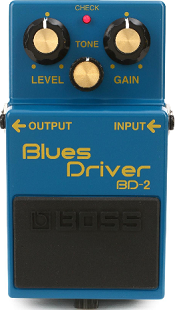BD-2
Boss BD-2 Blues Driver. While there is a complaint that some have regarding the pedal being treble-heavy, this is otherwise a well-respected overdrive pedal that can also veer into distortion tones when the highest levels of gain are dialed in.
Controls
- Knob 1: "Level": Pedal volume. Turn the knob fully counter-clockwise to turn down volume.
- Knob 2: "Tone": Fully clockwise is maximum treble frequencies in the tone. As knob is turned counter-clockwise those frequencies are filtered out.
- Knob 3: "Gain": Sets the level of overdrive/distortion of the pedal. Turning the knob clockwise increases the amount of overdrive/distortion.
- Footswitch 1: "On/Off": Toggles the pedal on or off.
While characterized as a good-sounding overdrive/distortion, the Blues Driver is also known for being "ice-picky" in the tone department, with a preponderance of treble frequencies. Most players end up having to turn down the tone knob in order to roll off those treble frequencies.
Bypass:Buffered
All Boss pedals are buffered. The BD-2 is not an exception.
General Information
Having been created and released in 1995, the BD-2 Blues Driver is an overdrive/distortion pedal that is a late-comer to the Boss line-up regarding their largely well-respected overdrive pedals.
In the middle of 2017, Boss appears to have changed the PCB that hosts the BD-2 circuit. Inside the updated BD-2 is a far smaller PCB. There are modifications of the BD-2 that can change the tonal character of the pedal. There is a Monte Allums modification (linked below) that we have purchased and are applying to our BD-2 in order to tame the "ice-pickyness" we believe is a bit of a problem. If you are intending to modify your Blues Driver, you're going to have to make sure you have a pre-2017 pedal that has electronics that are actually modifiable.
Pedal Manual
Phase Inversion:Yes/No
| Schematic ID | Electronic Part | Action | Phase State |
|---|---|---|---|
| X | X | X | X |
Schematic
Artists
We are currently unaware of any artists actively using the pedal now, or who have in the past.
- Additional Sources
